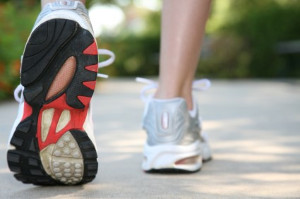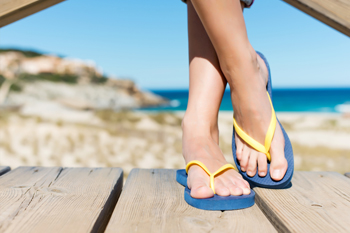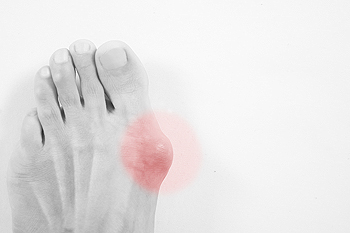Connect With Us
Blog
Different Shoes for Different Types of Running
 People who enjoy running are generally aware of the importance of choosing the right running shoe. These types of shoes fall into different categories based on running style. Additionally, for heavier runners, it is helpful to select shoes that have added stability. Research has indicated that determining how often running is practiced can help you to choose the correct shoe style. If your style of running includes exposure to mountains or trails, it may be beneficial to choose shoes that have additional traction. It is suggested that you consult with a podiatrist who can help you to determine which type of running shoe is best for you.
People who enjoy running are generally aware of the importance of choosing the right running shoe. These types of shoes fall into different categories based on running style. Additionally, for heavier runners, it is helpful to select shoes that have added stability. Research has indicated that determining how often running is practiced can help you to choose the correct shoe style. If your style of running includes exposure to mountains or trails, it may be beneficial to choose shoes that have additional traction. It is suggested that you consult with a podiatrist who can help you to determine which type of running shoe is best for you.
You should always make sure your running shoes fit properly in order to avoid injury. For more information, contact one of our podiatrists from Foot & Ankle Associates of Maine. Our doctors can provide the care you need to keep you pain-free and on your feet.
Choosing the Right Running Shoe for Your Foot Type
Improper shoe sizing can cause a myriad of problems for your feet. Shoes that don’t fit you properly can lead to muscular imbalances in your body, which can result in foot, knee, and hip injuries.
Tips for Finding the Right Running Shoe
- Make sure you have a thumb’s width of wiggle room between the end of your longest toe and the front of the shoe.
- There should be little to no slipping at the heel
- Don’t assume your size in one shoe brand will be your size in another
- Do not lace up your shoes too tightly
- Walk around in the store with your new shoes before you buy them
If you have any questions please feel free to contact our our office located in Brunswick, ME . We offer the newest diagnostic and treatment technologies for all your foot and ankle needs.
Wearing Flip Flops May Negatively Affect The Feet
 Research has indicated that frequently wearing flip flops may cause unpleasant foot conditions to gradually develop. These can include heel and ankle pain, in addition to increasing the likelihood of stubbing your toe, which may lead to a broken toe. The average flip flop has minimal support for the overall foot. This includes little cushioning in the heel and arch area, which can contribute to a lack of shock absorption. The toes may undergo stress as they attempt to keep the shoe on the foot, as a result of excessive gripping. People who wear this type of shoe often take shorter steps, which may alter their style of walking. Painful conditions such as heel spurs and plantar fasciitis may develop as a result of wearing flip flops. Additional information is available from a podiatrist about the harmful effects wearing flip flops could have on the feet.
Research has indicated that frequently wearing flip flops may cause unpleasant foot conditions to gradually develop. These can include heel and ankle pain, in addition to increasing the likelihood of stubbing your toe, which may lead to a broken toe. The average flip flop has minimal support for the overall foot. This includes little cushioning in the heel and arch area, which can contribute to a lack of shock absorption. The toes may undergo stress as they attempt to keep the shoe on the foot, as a result of excessive gripping. People who wear this type of shoe often take shorter steps, which may alter their style of walking. Painful conditions such as heel spurs and plantar fasciitis may develop as a result of wearing flip flops. Additional information is available from a podiatrist about the harmful effects wearing flip flops could have on the feet.
Flip-flops are not always the best choice of footwear. If you have any concerns about your feet or ankles, contact one of our podiatrists from Foot & Ankle Associates of Maine. Our doctors will assist you with all of your foot and ankle needs.
Flip-Flops and Feet
When the weather starts warming up, people enjoy wearing flip-flops. Flip-flops are comfortable, stylish, and easy to slip on and off; they're perfect for any summer beach goer. However, these shoes can cause harm to the feet.
How Can Flip-Flops Affect Me Long-Term?
- Ankle problems
- Hip problems
- Lower back problems
- Pain in the balls of the feet
- Problems with foot arches
- Changes in the way you walk
Are There Injuries Associated with Flip-Flops?
Yes. Since flip-flops are relatively weak and do not provide the same amount of support as sneakers, people who wear flip-flops regularly are more susceptible to injuries. On top of that, the open nature of the shoe makes your feet more prone to other problems, such as cuts and even infections. Common injuries and ailments include:
- Sprained ankles
- Blisters
- Infections
- Cuts and Scrapes
I like Wearing Flip-Flops. Are There Safe Alternatives?
When buying flip-flops, try to find ones that have sturdy soles and that are made of high-quality materials that will support for your feet. These flip-flops will cost more but will also last longer as a result.
If you have any questions please feel free to contact our office located in Brunswick, ME . We offer the newest diagnostic and treatment technologies for all your foot and ankle needs.
How Do Bunions Develop?
 A bunion typically develops gradually, and is considered to be a deformity. It is defined as a bony protrusion that forms on the side of the big toe. This condition can occur as a result of genetic factors, or from wearing shoes that do not have adequate room for the toes to move freely in. Symptoms that many patients may experience are redness and swelling surrounding the affected area, a burning sensation, or the feeling of numbness. In severe cases, an X-ray may be necessary to perform to help determine how large the bunion is, in addition to observing any existing arthritis. Moderate relief may be found if orthotics are worn, as well as resting the foot. If the bunion is causing extreme pain, surgery may be a viable option for treatment. This can be successful in permanently straightening and realigning the joints and bones. If you have developed a bunion, it is advised that you schedule a consultation with a podiatrist who can offer treatment options that are correct for you.
A bunion typically develops gradually, and is considered to be a deformity. It is defined as a bony protrusion that forms on the side of the big toe. This condition can occur as a result of genetic factors, or from wearing shoes that do not have adequate room for the toes to move freely in. Symptoms that many patients may experience are redness and swelling surrounding the affected area, a burning sensation, or the feeling of numbness. In severe cases, an X-ray may be necessary to perform to help determine how large the bunion is, in addition to observing any existing arthritis. Moderate relief may be found if orthotics are worn, as well as resting the foot. If the bunion is causing extreme pain, surgery may be a viable option for treatment. This can be successful in permanently straightening and realigning the joints and bones. If you have developed a bunion, it is advised that you schedule a consultation with a podiatrist who can offer treatment options that are correct for you.
If you are suffering from bunions, contact one of our podiatrists of Foot & Ankle Associates of Maine. Our doctors can provide the care you need to keep you pain-free and on your feet.
What Is a Bunion?
A bunion is formed of swollen tissue or an enlargement of boney growth, usually located at the base joint of the toe that connects to the foot. The swelling occurs due to the bones in the big toe shifting inward, which impacts the other toes of the foot. This causes the area around the base of the big toe to become inflamed and painful.
Why Do Bunions Form?
Genetics – Susceptibility to bunions are often hereditary
Stress on the feet – Poorly fitted and uncomfortable footwear that places stress on feet, such as heels, can worsen existing bunions
How Are Bunions Diagnosed?
Doctors often perform two tests – blood tests and x-rays – when trying to diagnose bunions, especially in the early stages of development. Blood tests help determine if the foot pain is being caused by something else, such as arthritis, while x-rays provide a clear picture of your bone structure to your doctor.
How Are Bunions Treated?
- Refrain from wearing heels or similar shoes that cause discomfort
- Select wider shoes that can provide more comfort and reduce pain
- Anti-inflammatory and pain management drugs
- Orthotics or foot inserts
- Surgery
If you have any questions, please feel free to contact our office located in Brunswick, ME . We offer the newest diagnostic and treatment technologies for all your foot care needs.
Types of Arthritis That Can Affect The Feet
 The medical term that is known as osteoarthritis may cause bone spurs at the bottom of the big toe, which may lead to the development of a bunion. If you have this type of arthritis, relief may be found when larger size shoes are worn. This may prevent additional pressure from being exerted on the bunion. A common type of arthritis that is referred to as rheumatoid arthritis typically causes inflammation on the ball of the foot. Calluses may develop as a result of the bones pushing against the skin on that part of the foot. An additional form of arthritis, which is known as gout, can affect the big toe, and may come from eating foods that are high in purine levels. Gout attacks may be prevented when healthy eating habits are implemented into the daily routine. If you have arthritis in your feet, it is strongly suggested that you consult with a podiatrist who can help you to manage this condition.
The medical term that is known as osteoarthritis may cause bone spurs at the bottom of the big toe, which may lead to the development of a bunion. If you have this type of arthritis, relief may be found when larger size shoes are worn. This may prevent additional pressure from being exerted on the bunion. A common type of arthritis that is referred to as rheumatoid arthritis typically causes inflammation on the ball of the foot. Calluses may develop as a result of the bones pushing against the skin on that part of the foot. An additional form of arthritis, which is known as gout, can affect the big toe, and may come from eating foods that are high in purine levels. Gout attacks may be prevented when healthy eating habits are implemented into the daily routine. If you have arthritis in your feet, it is strongly suggested that you consult with a podiatrist who can help you to manage this condition.
Arthritis can be a difficult condition to live with. If you are seeking treatment, contact one of our podiatrists from Foot & Ankle Associates of Maine. Our doctors can provide the care you need to keep you pain-free and on your feet.
Arthritic Foot Care
Arthritis is a term that is commonly used to describe joint pain. The condition itself can occur to anyone of any age, race, or gender, and there are over 100 types of it. Nevertheless, arthritis is more commonly found in women compared to men, and it is also more prevalent in those who are overweight. The causes of arthritis vary depending on which type of arthritis you have. Osteoarthritis for example, is often caused by injury, while rheumatoid arthritis is caused by a misdirected immune system.
Symptoms
- Swelling
- Pain
- Stiffness
- Decreased Range of Motion
Arthritic symptoms range in severity, and they may come and go. Some symptoms stay the same for several years but could potentially get worse with time. Severe cases of arthritis can prevent its sufferers from performing daily activities and make walking difficult.
Risk Factors
- Occupation – Occupations requiring repetitive knee movements have been linked to osteoarthritis
- Obesity – Excess weight can contribute to osteoarthritis development
- Infection – Microbial agents can infect the joints and trigger arthritis
- Joint Injuries – Damage to joints may lead to osteoarthritis
- Age – Risk increases with age
- Gender –Most types are more common in women
- Genetics – Arthritis can be hereditary
If you suspect your arthritis is affecting your feet, it is crucial that you see a podiatrist immediately. Your doctor will be able to address your specific case and help you decide which treatment method is best for you.
If you have any questions, please feel free to contact our office located in Brunswick, ME . We offer the newest diagnostic and treatment technologies for all your foot care needs.
